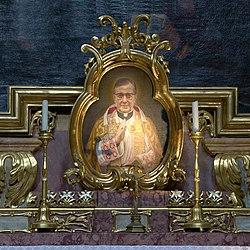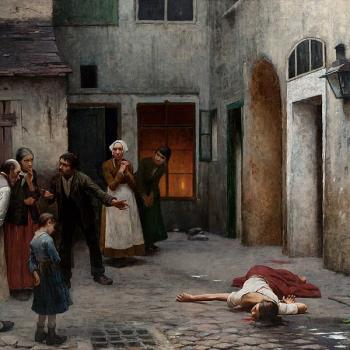An Italian atheist I’ve never heard of published an open letter to Pope Francis with a string of questions (challenges, is probably more like it) to the Pope.
The Holy Father astonished everyone, including, I am sure, said Italian atheist, by answering him.
The letter Pope Francis wrote is, like so much else he does, deeply pastoral. It’s clear when you read it that he was responding as a pastor of souls.
However, there was one paragraph that has gotten the whole internet in one of its kerfluffles. The atheist had evidently asked one of the usual atheist questions about can they, with their unbelief, go to heaven. For all I know, this question with its unadmitted longing for grace, was what caught the Holy Father’s attention in the first place.
I know, based on the large number of similar comments I get both here and in my public life, that this particular question is almost ubiquitous among atheists. They ask it — or rather, they use it as a means of denunciation — almost constantly. I’ve often thought that there was an underlying hunger for all the things that Christ offers — forgiveness, grace, peace that passes understanding and eternal life — in the way they fling this particular challenge down so reptitively.
Maybe the Pope saw the same thing I do and his Pastor’s heart reached out to this man in response.
I don’t know if that’s true. I only know that I often have an impulse to comfort them when they do this, but I do not have the pastoral tools to do it.
The Pope obviously was trying to tell this man one of the great truths of the universe with his answer: Christ’s grace and love are for everyone. He loves us all. He loves us every one. And yes, that includes atheists, unbelievers and people who spit on Jesus’ name.
The beautiful parable we call the Prodigal Son is Jesus’ way of telling us this. God loves us, even when we don’t love Him. He yearns for us, even when we turn our backs on Him.
So of course atheists can go to heaven. Heaven was made for them, just the same as it was every other human being.
The question is not can they, but will they?
Pope Francis comments in his letter that “God’s mercy has no limits if he who asks for mercy does so with contrition and a sincere heart.” This is something every Christian knows and has experienced. I can attest from my own life that God’s mercy is indeed limitless.
But the Pope adds something else after that and this has set the internet on its ear all day long.
“… the issue for those who do not believe in God is in following their own conscience,” he wrote.
This one sentence has set the bells ringing since it sounds for all the world like a direct admonishment to practice self-referencing moral relativism by the Pope himself.
After all, if all that’s necessary is to never violate your own personal code of conduct, then a universalist understanding of heaven and the Almighty become (excuse the pun) absolute. We go to heaven in just the way that the punsters and social experimenters have been telling us we do: By “self-actualization” and following a self-referencing, self-promoting, self-idolizing version of morality that is a-ok because it checks with our “own conscience.”
The question is, did Pope Francis really mean that?
Is he telling us that heaven is a slam-dunk for everybody, so long as they don’t cross their own conscience? Considering the messy and highly personal things that consciences are, I certainly hope not. If the unrepentant self-worshipping are going to heaven, then heaven would be pretty much like the world we have now: Mean, selfish, ego-driven, bloody and cruel.
More to the point, it would be a place where God Himself would be most uncomfortable.
Let’s go back to the question I asked a moment ago. Atheists most assuredly can go to heaven. The question I asked, and I think it’s the salient one, is, Will they?
If someone has never heard the name of Christ, then they have to function by the light they are given, and the Church teaches that they are judged according to that light. However, even for them, their only hope is through this Jesus they do not know. There is one Way, and that is Jesus Christ and the atonement he bought for us with his shed blood on Calvary.
But if someone who knows of Christ and has heard of Him all their lives, openly and dramatically chooses the darkness over the light, is God going to throw a net around them and drag them to heaven?
Did the father chase down the prodigal son, hog-tie him and drag him home?
No.
Pope Francis began his papacy by admonishing us not to be self-referencing. The scriptures plainly say things like “The fool says in his heart, there is no God. They have done abominable works.”
In my opinion that pretty much describes folks who defame Christ while they abort, euthanize and plunder their way through life.
So what did the Pope mean?
I don’t have a full answer for that, although I’m sure one is coming. I am also not a theologian. But I think what he meant is that someone who does not believe in God still has a responsibility to follow the inherent dictates of right and wrong that are planted in every heart. We call this natural law. It’s what tells everyone, everywhere, that murder is wrong. It’s how we know, without complex moral reasoning, that killing innocents, rape, and cruelty in all its forms are wrong.
This runs deeper than any commandment. It is written by the hand of God on each individual heart.
Even an atheist knows these things, and when they use their verbal skills to frame arguments denying these basic truths of moral existence, they are denying, in fact and in truth, their own God-given consciences. When they replace the truth of God that is encoded into their souls, with their own self-referencing anti-God, anti-life morality, there is no second chance for them without repentance and contrition.
At the least and at the beginning, every person must heed this internal voice, which is, whether they will admit it or not, the voice of the Divine. That is the beginning of our lives as moral beings.
Which of course we are. Human beings are made in the image and likeness of God, which means that we are also moral agents — free moral agents — acting in the universe.
We know what is right and wrong. We know it because it is part of our very being to know it. But we also have the verbal skills to weave mental sophistry that we claim exempts us from accepting these dictates of our true nature.
That is the beginning of sin, the first and primary rebellion against the God Who made us. It’s only remedy is to go back where Pope Francis began his discussion on this topic; to the point where we approach God through the open doorway of Christ’s sacrifice with true contrition and ask forgiveness, which, as the Pope says, He is always ready to give us.












